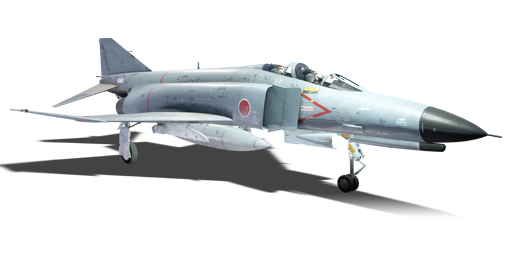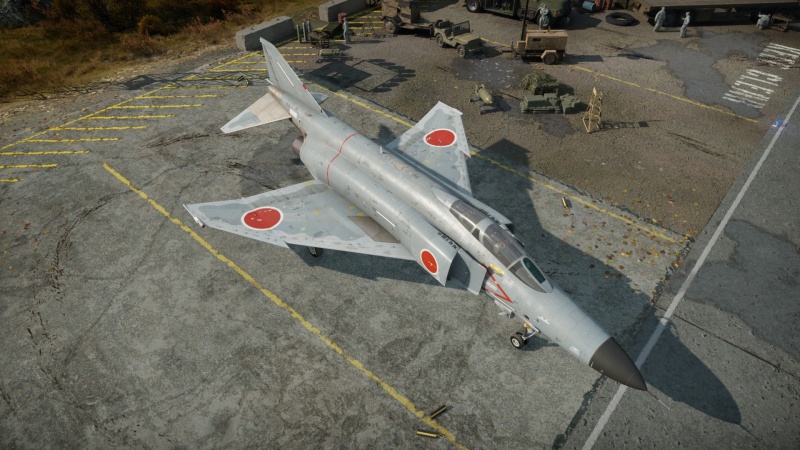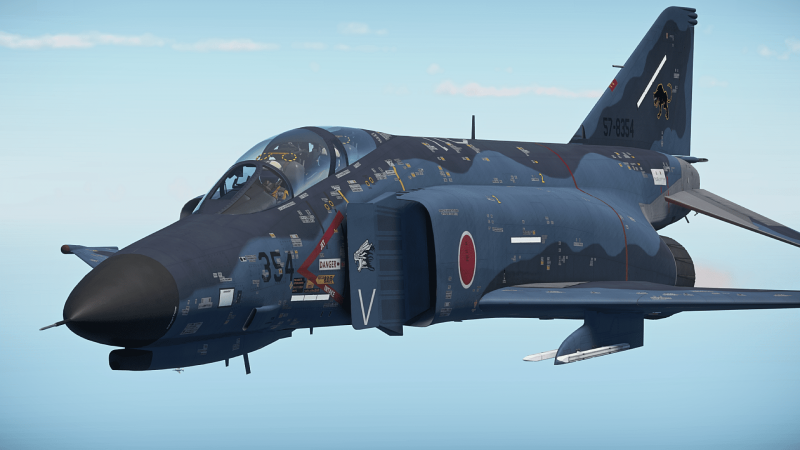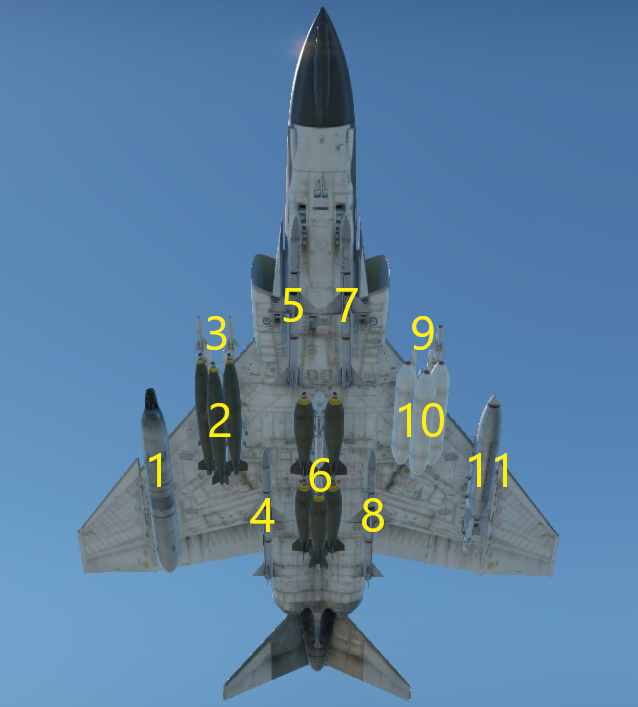Difference between revisions of "F-4EJ Kai Phantom II"
(→Pros and cons) |
(→History: Adding history and brief description of the jet) (Tag: Visual edit) |
||
| Line 12: | Line 12: | ||
<!-- ''In the description, the first part should be about the history of and the creation and combat usage of the aircraft, as well as its key features. In the second part, tell the reader about the aircraft in the game. Insert a screenshot of the vehicle, so that if the novice player does not remember the vehicle by name, he will immediately understand what kind of vehicle the article is talking about.'' --> | <!-- ''In the description, the first part should be about the history of and the creation and combat usage of the aircraft, as well as its key features. In the second part, tell the reader about the aircraft in the game. Insert a screenshot of the vehicle, so that if the novice player does not remember the vehicle by name, he will immediately understand what kind of vehicle the article is talking about.'' --> | ||
The '''{{Specs|name}}''' is a rank {{Specs|rank}} Japanese jet fighter {{Battle-rating}}. It was introduced in [[Update "Direct Hit"]]. | The '''{{Specs|name}}''' is a rank {{Specs|rank}} Japanese jet fighter {{Battle-rating}}. It was introduced in [[Update "Direct Hit"]]. | ||
| + | |||
| + | The Japanese retrofit of F-4EJ by early 1980s to enhance its combat capabilities and currently sitting at the end of the tech-tree; EJ Kai introduced one of the earliest PD radar in game, revised avionics, as well as boosting new varieties of A2A weapon, making it a formidable interceptor to be dealt-with. | ||
== General info == | == General info == | ||
| Line 226: | Line 228: | ||
== History == | == History == | ||
<!-- ''Describe the history of the creation and combat usage of the aircraft in more detail than in the introduction. If the historical reference turns out to be too long, take it to a separate article, taking a link to the article about the vehicle and adding a block "/History" (example: <nowiki>https://wiki.warthunder.com/(Vehicle-name)/History</nowiki>) and add a link to it here using the <code>main</code> template. Be sure to reference text and sources by using <code><nowiki><ref></ref></nowiki></code>, as well as adding them at the end of the article with <code><nowiki><references /></nowiki></code>. This section may also include the vehicle's dev blog entry (if applicable) and the in-game encyclopedia description (under <code><nowiki>=== In-game description ===</nowiki></code>, also if applicable).'' --> | <!-- ''Describe the history of the creation and combat usage of the aircraft in more detail than in the introduction. If the historical reference turns out to be too long, take it to a separate article, taking a link to the article about the vehicle and adding a block "/History" (example: <nowiki>https://wiki.warthunder.com/(Vehicle-name)/History</nowiki>) and add a link to it here using the <code>main</code> template. Be sure to reference text and sources by using <code><nowiki><ref></ref></nowiki></code>, as well as adding them at the end of the article with <code><nowiki><references /></nowiki></code>. This section may also include the vehicle's dev blog entry (if applicable) and the in-game encyclopedia description (under <code><nowiki>=== In-game description ===</nowiki></code>, also if applicable).'' --> | ||
| − | + | After the introduction of Mitsubishi F-4EJ since 1968 and built the very last Phantom series in 1981 (140th of MHI, 17-8440), the EJ has been one of the cornerstone of JASDF along with F-104J and then later F-15J/DJ; but being a jet from mid-1960s with inferior avionics and armaments to the latest Soviet jets also meant an extensive upgrade for the fleet of EJs. The plans for upgrading the 90 MHI-built F-4EJs which were still airworthy started in 1981 and the first retrofitted jet (07-8431) took into the skies by July 1984 and joined JASDF in December; upgrades include: | |
| + | |||
| + | * Installation of J/AYK-1 guidance system for AShM and unguided bombs | ||
| + | * Replacing AN/APQ-120 to the latest AN/APG-66J with pulse-doppler capabilities; J/AVQ-3 radar display and guidance system for SARH AAM | ||
| + | * New J/ASN-4 digital INS navigation system | ||
| + | * New Kaiser Electronics HUD | ||
| + | * J/APR-6 RWR, AN/APX-76A IFF and AN/ALQ-131 countermeasures | ||
| + | * HOTAS controls | ||
| + | * Lightning rods by the radome | ||
| + | * New fuel tanks | ||
| + | |||
| + | These features passed for the budgets of FY1987 and the upgrades for these jets finished by 1990; by the time when F-15J/DJ and F-2 joined JASDF in larger quantities, F-4EJs (including the recon variant, RF-4EJ) started to retire from JASDF and by March 2020, most of these jets retired from JASDF and on 17 March, 2021, the very last 3 F-4EJ (Kai)s of JASDF (17-8301[4038], [[F-4EJ ADTW|47-8336]] [M036] and '''07-8431[M131]''') from the Air Development and Test Wing (ADTW) in Gifu Airbase, Nagoya, bidding farewell of Phantoms in JASDF service. <ref>https://theaviationist.com/2021/03/17/japans-last-three-f-4ej-phantoms-have-just-flown-for-the-last-time/</ref> | ||
| + | |||
| + | ''Sidenote: '''07-8431 (EJ Kai) and''' '''17-8301''' '''(EJ; the very first EJ of JASDF)''' were also used for the sampling of the in-game representation of this jet as the devs and DMM announced for a trip to Gifu before their ultimate decommission.[https://warthunder.dmm.com/news/detail/8612]'' | ||
== Media == | == Media == | ||
Revision as of 19:17, 12 February 2023
| This page is about the Japanese jet fighter F-4EJ Kai Phantom II. For other versions, see F-4 Phantom II (Family). |
Contents
Description
The F-4EJ Kai Phantom II is a rank VIII Japanese jet fighter with a battle rating of 12.0 (AB) and 12.3 (RB/SB). It was introduced in Update "Direct Hit".
The Japanese retrofit of F-4EJ by early 1980s to enhance its combat capabilities and currently sitting at the end of the tech-tree; EJ Kai introduced one of the earliest PD radar in game, revised avionics, as well as boosting new varieties of A2A weapon, making it a formidable interceptor to be dealt-with.
General info
Flight performance
| Characteristics | Max Speed (km/h at 12,192 m) |
Max altitude (metres) |
Turn time (seconds) |
Rate of climb (metres/second) |
Take-off run (metres) | |||
|---|---|---|---|---|---|---|---|---|
| AB | RB | AB | RB | AB | RB | |||
| Stock | 2,255 | 2,221 | 16000 | 26.5 | 27.4 | 141.6 | 131.6 | 850 |
| Upgraded | 2,419 | 2,340 | 25.6 | 26.0 | 204.3 | 172.0 | ||
Details
| Features | |||||
|---|---|---|---|---|---|
| Combat flaps | Take-off flaps | Landing flaps | Air brakes | Arrestor gear | Drogue chute |
| X | ✓ | ✓ | ✓ | ✓ | ✓ |
| Limits | ||||||
|---|---|---|---|---|---|---|
| Wings (km/h) | Gear (km/h) | Flaps (km/h) | Max Static G | |||
| Combat | Take-off | Landing | + | - | ||
| 1458 | 463 | N/A | 580 | 463 | ~11 | ~4 |
| Optimal velocities (km/h) | |||
|---|---|---|---|
| Ailerons | Rudder | Elevators | Radiator |
| < 810 | < 750 | < 700 | N/A |
Engine performance
| Engine | Aircraft mass | |||||
|---|---|---|---|---|---|---|
| Engine name | Number | Basic mass | Wing loading (full fuel) | |||
| General Electric J79-GE-17 | 2 | 13,965 kg | 403 kg/m2 | |||
| Engine characteristics | Mass with fuel (no weapons load) | Max Takeoff Weight | ||||
| Weight (each) | Type | 9m fuel | 20m fuel | 30m fuel | ||
| 1,750 kg | Afterburning axial-flow turbojet | 15,724 kg | 17,787 kg | 19,829 kg | 24,000 kg | |
| Maximum engine thrust @ 0 m (RB/SB) | Thrust to weight ratio @ 0 m (WEP) | |||||
| Condition | 100% | WEP | 9m fuel | 20m fuel | 30m fuel | MTOW |
| Stationary | 5,200 kgf | 8,008 kgf | 1.02 | 0.90 | 0.81 | 0.67 |
| Optimal | 5,200 kgf (0 km/h) |
10,170 kgf (1,400 km/h) |
1.29 | 1.14 | 1.03 | 0.85 |
Survivability and armour
- 8.5 mm of Steel below the cockpit.
Modifications and economy
Armaments
| Ballistic Computer | |||
|---|---|---|---|
| CCIP (Guns) | CCIP (Rockets) | CCIP (Bombs) | CCRP (Bombs) |
| |
|
|
|
Offensive armament
The F-4EJ Kai Phantom II is armed with:
- A choice between two presets:
- 1 x 20 mm JM61A1 cannon, belly-mounted (640 rpg)
- 1 x 20 mm JM61A1 cannon + 90 x countermeasures
Suspended armament
The F-4EJ Kai Phantom II can be outfitted with the following ordnance presets:
- Without load
- 2 x AIM-9P Sidewinder missiles
- 4 x AIM-9P Sidewinder missiles
- 4 x AIM-9L Sidewinder missiles
- 4 x AIM-7E Sparrow missiles
- 4 x AIM-7F Sparrow missiles
- 3 x 20 mm GAU-4 cannons (1,200 rpg = 3,600 total)
- 24 x 500 lb LDGP Mk 82 bombs (12,000 lb total)
- 17 x 750 lb M117 cone 45 bombs (12,750 lb total)
- 285 x FFAR Mighty Mouse rockets
- 60 x Zuni Mk32 Mod 0 ATAP rockets
Custom loadout options
| 1 | 2 | 3 | 4 | 5 | 6 | 7 | 8 | 9 | 10 | 11 | ||
|---|---|---|---|---|---|---|---|---|---|---|---|---|
| 20 mm GAU-4 cannons (1,200 rpg) | 1 | 1 | 1 | |||||||||
| 500 lb LDGP Mk 82 bombs | 6 | 3 | 6 | 3 | 6 | |||||||
| 750 lb M117 cone 45 bombs | 3 | 3 | 5 | 3 | 3 | |||||||
| FFAR Mighty Mouse rockets | 57 | 57 | 57 | 57 | 57 | |||||||
| Zuni Mk32 Mod 0 ATAP rockets | 12 | 12 | 12 | 12 | 12 | |||||||
| AIM-7E Sparrow missiles | 1* | 1* | 1* | 1* | ||||||||
| AIM-7F Sparrow missiles | 1* | 1* | 1* | 1* | ||||||||
| AIM-9L Sidewinder missiles | 2 | 2 | ||||||||||
| AIM-9P Sidewinder missiles | 1, 2 | 1, 2 | ||||||||||
| Maximum permissible loadout weight: 7,257 kg Maximum permissible weight imbalance: 1,500 kg | ||||||||||||
| * AIM-7E and AIM-7F Sparrow missiles cannot be mixed, only one type may be equipped across hardpoints | ||||||||||||
Usage in battles
Describe the tactics of playing in the aircraft, the features of using aircraft in a team and advice on tactics. Refrain from creating a "guide" - do not impose a single point of view, but instead, give the reader food for thought. Examine the most dangerous enemies and give recommendations on fighting them. If necessary, note the specifics of the game in different modes (AB, RB, SB).
Pros and cons
Pros:
- Eased up modifications over the F-4EJ
- Comes with 2 x AIM-9Ps stock instead of 2 x AIM-9Bs
- 4 x AIM-9Ps is a tier I mod without the need of AIM-9Es
- A wide range of suspended armaments, suitable for any playstyle
- Powerful AIM-7F SARH missiles
- Top-of-the-line AIM-9L missiles, having excellent manoeuvrability of 30G, long range, great all-aspect tracking, and being somewhat flare resistant
- Deadly frontal armament with high burst mass
- Makes use of a ballistic computer for assisting in the aim of cannons, rockets, and bombs against ground targets
- Large reserve of countermeasures
- AN/APG-66 radar - has diverse scan and tracking modes, very high resistance to notching and chaff, very long range
Cons:
- Limited ammunition in the frontally-mounted cannon
- Lacks guided ordnance, limiting ground attack ability
- Terrible manoeuvrability along with mediocre acceleration and top speed, particularly compared to common opponents
- Doesn't have an Agile Eagle package like the F-4E and F-4F to increase manoeuvrability
History
After the introduction of Mitsubishi F-4EJ since 1968 and built the very last Phantom series in 1981 (140th of MHI, 17-8440), the EJ has been one of the cornerstone of JASDF along with F-104J and then later F-15J/DJ; but being a jet from mid-1960s with inferior avionics and armaments to the latest Soviet jets also meant an extensive upgrade for the fleet of EJs. The plans for upgrading the 90 MHI-built F-4EJs which were still airworthy started in 1981 and the first retrofitted jet (07-8431) took into the skies by July 1984 and joined JASDF in December; upgrades include:
- Installation of J/AYK-1 guidance system for AShM and unguided bombs
- Replacing AN/APQ-120 to the latest AN/APG-66J with pulse-doppler capabilities; J/AVQ-3 radar display and guidance system for SARH AAM
- New J/ASN-4 digital INS navigation system
- New Kaiser Electronics HUD
- J/APR-6 RWR, AN/APX-76A IFF and AN/ALQ-131 countermeasures
- HOTAS controls
- Lightning rods by the radome
- New fuel tanks
These features passed for the budgets of FY1987 and the upgrades for these jets finished by 1990; by the time when F-15J/DJ and F-2 joined JASDF in larger quantities, F-4EJs (including the recon variant, RF-4EJ) started to retire from JASDF and by March 2020, most of these jets retired from JASDF and on 17 March, 2021, the very last 3 F-4EJ (Kai)s of JASDF (17-8301[4038], 47-8336 [M036] and 07-8431[M131]) from the Air Development and Test Wing (ADTW) in Gifu Airbase, Nagoya, bidding farewell of Phantoms in JASDF service. [1]
Sidenote: 07-8431 (EJ Kai) and 17-8301 (EJ; the very first EJ of JASDF) were also used for the sampling of the in-game representation of this jet as the devs and DMM announced for a trip to Gifu before their ultimate decommission.[1]
Media
- Skins
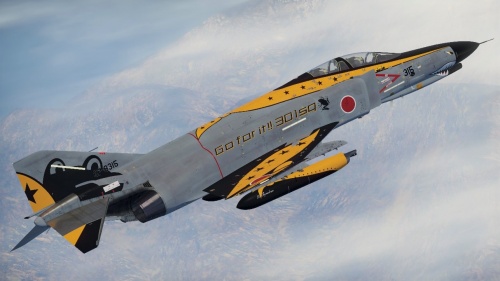
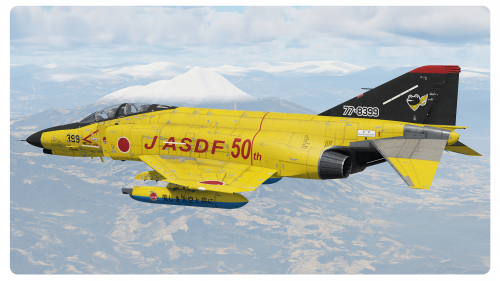
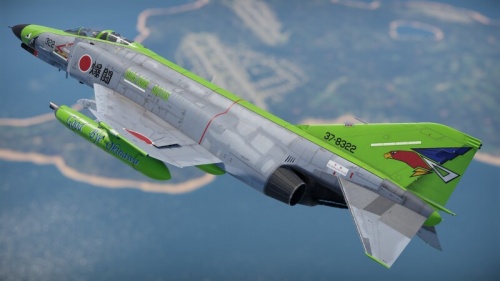
See also
- Related development
- Aircraft of comparable role, configuration and era
- Mikoyan-Gurevich MiG-21 (Family)
- SAAB J35D Draken
- Dassault Mirage IIIC
External links
| Japan jet aircraft | |
|---|---|
| IJNAS | |
| Experimental | Kikka |
| Reconnaissance | R2Y2 Kai V1 · R2Y2 Kai V2 · R2Y2 Kai V3 |
| IJAAS | |
| Fighters | Ki-200 |
| JASDF | |
| Fighters | F-86F-30 ▅ · F-86F-40 ▅ · F-86F-40 JASDF▅ |
| F-104J | |
| F-4EJ Phantom II · F-4EJ ADTW · F-4EJ Kai Phantom II | |
| F-15J · F-15J(M) | |
| F-16AJ | |
| F-1 | |
| Trainers | T-2 Early · T-2 |
| Foreign | |
| Thailand | ▄AV-8S · ▄F-5E FCU |


